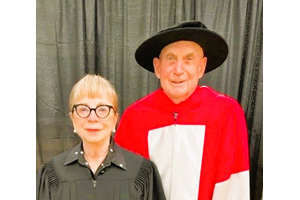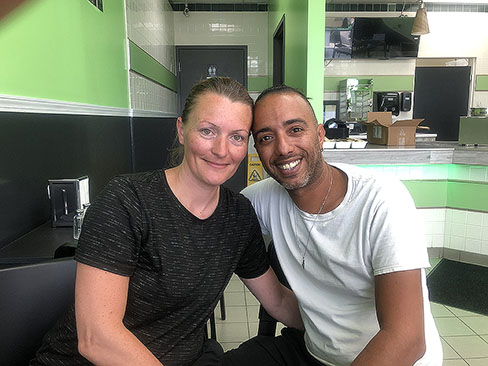Local News
Community leaders David Asper, Harvey and Sandra Secter among the honourees at recent University of Manitoba convocation

By MYRON LOVE Community leaders David Asper and Harvey Secter were among ten individuals who were recipients of honorary degrees at the University of Manitoba’s most recent convocation.
For Harvey Secter, who was recognized with a Doctorate of Laws, the award was the culmination of a 30-plus year relationship with the university in one capacity or another. What made the event even sweeter for the university’s former Chancellor is that his wife, Sandra, was also honoured by the university with the Peter D. Curry Chancellor’s Award, which is given out annually to an individual who “has made outstanding contributions to the develop of the university.”
The Secter name is well known in our community. Harvey’s parents, the late Joe and Gwen Secter, set the bar high in terms of philanthropy and community leadership for their children – and Harvey and Sandra have certainly made their own mark in community service.
Harvey Secter began his working career in the family business, succeeding his father in operating Ricki’s Canada Ltd., a chain of ladies’ clothing stores across Canada, in partnership with his brother-in-law, Sam Guralnick.
In his time in business, Secter was involved with the Jewish Child and Family Service, which led into volunteering with the United Way, including chairing the 1998 United Way campaign.
He was part of the fundraising effort on behalf of the St. Boniface Hospital’s new Research Centre and served on the board of the Jewish Foundation of Manitoba for more than 12 years.
In 1982, Secter and Guralnick sold the business and Secter, after fully retiring from the company – by then in his 40s – returned in 1988 to the University of Manitoba – from whence he had previously earned a Bachelor of Commerce degree in 1969 – to pursue a career in law. He followed that up with a Master’s degree in Law from Harvard in 1995.
That same year, after returning to Winnipeg, he became a lecturer in Law at his alma mater, teaching in the fields of mediation and arbitration. In 1999, he was appointed Dean of the Law faculty. And, after retiring from that position in 2008, he was asked to serve as Chancellor of the university, a role he filled until 2019.
It was her contributions to the university as the wife of the Chancellor that earned Sandra Secter the Peter Curry Award. Harvey notes that it is unusual in that Sandra has never held an official position at the university.
The Chancellor serves, in a sense, as the university’s leading ambassador, Harvey Secter points out, and Sandra was the consummate “ambassador’s wife” by regularly engaging all the stakeholders, be they students, faculty, alumni or donors.
In her own right, Sandra Secter has contributed substantially to our community with leadership roles with the National Council of Jewish Women, the Combined Jewish Appeal – where she and close friend Marsha Cowan served as co-chairs of the 1997/8 campaign and again in 2001– as well as many arts organizations over the years.
“It was been really gratifying that others have found our joint efforts as volunteers over the years on behalf of the university and the community at large to be meaningful and worthy of recognition at this stage of our lives,” Secter concludes.

For David Asper – who was also recognized with a Doctorate of Laws, it was more of a bittersweet moment because David Milgaard wasn’t able to share the podium with him. Milgaard, the man that Asper spent many years moving heaven and earth to free from prison after he was falsely convicted for murder, was also scheduled to receive an honorary degree but, sadly, passed away in mid-May.
“I accepted his degree on behalf of David,” Asper says, “but it wasn’t the same without him. I missed having my guy beside me. That was to be his moment of full redemption.”
For readers who are unaware – or may have forgotten the details, Milgaard was a young man from Winnipeg – a drifter at the time – who happened to be crashing in Saskatoon for a period. In 1969, on a cold winter morning, a young nurse by the name of Gail Miller was brutally raped and murdered at a bus stop in Saskatoon. Footsteps in the snow led to the nearby house where the then-16-year-old Milgaard was temporarily staying.
Saskatoon police soon decided that Milgaard was their man. As the great Canadian criminal lawyer Eddie Greenspan pointed out in his autobiography, once the police and the Crown zero in on a suspect, they do their best to prove his guilt and ignore evidence that points to his innocence.
Thus, even though Milgaard steadfastly insisted that he was innocent, he was convicted of the crime and sentenced to life in prison. Through a quirk in our prison system, once convicted you can only get parole if you acknowledge your guilt – something which Milgaard refused to do.
David’s mother, the late Joyce Milgaard, believed in her son’s innocence and worked tirelessly to find anyone who would give him a fair hearing. In 1986, after 16 years in prison, the late Hersh Wolch took on the case and brought David Asper – a lawyer for Wolch’s firm – in to help.
Asper was soon spearheading the defense.
“I worked on David’s case for six years before he was released in 1992,” Asper recalls. “He was finally fully exonerated in 1997 by science and the evidence provided by DNA analysis. We became very close. A certain level of intimacy and intensity developed in our relationship”
(Another man – a serial killer as it turned out – who happened to be staying at the same house where Milgaard was staying at that time – was subsequently arrested and convicted of the murder.)
Asper observes that life outside went on in the years that Milgaard was incarcerated. “I met Ruth, the woman who would become my wife in 1986,” he says. “We had two children before David was released and our third before he was exonerated While my wife was working at starting a business and I was travelling across the country pursuing justice for David, his mother stepped up and helped us with our own family.”
In recent days, with kids grown, David Asper reports that he has cut back on his activities. “I am taking it easier,” he says. “I am still involved though in public service as a director of the North Portage Partnership Board and Chair of the Manitoba Police Commission, which I have found to be an interesting role.”
Local News
New Israeli restaurant opens in River Heights

By BERNIE BELLAN (July 6, 2025) It’s been a long time since our community has been able to welcome the opening of a restaurant that specializes in Israeli food.
That void is now going to be filled with the opening of The Green Falafel, at 1833 Grant (corner of Centennial – next to the Subway).

The restaurant is the fulfillment of a dream long held by the husband and wife team of Ariel and Eden Maudi, who have been living in Winnipeg the past 11 years.
Ariel, who was born in Israel and grew up in Beer Sheva, says that he worked in telecommunications in Ramat Gan for several years. He adds though that he had always dreamed of owning his own falafel stand in Israel, but life was difficult there and he decided to come to Canada as a tourist to see whether there were any opportunities here for him, Eden and their two young children.
Eden, who was born in Russia and moved to Israel with her family in 1996, stayed behind with the two kids, who were both pre-schoolers, while Ariel tested the waters in Canada first.
Ariel says he came to Canada as a tourist in 2013. His first stop was in Toronto, where he acquired his 1st class driver’s license. At the end of 2013 he moved to Winnipeg where he began working as a truck driver. Soon he found himself employed as a successful sales person at Vickar Nissan where, he says, he once achieved the status as the top car sales person in Canada. After working at Vickar Nissan for a number of years, Ariel began working as an installer for Bell MTS.
Meanwhile, Eden began working at a Walmart, later at the Costco on Regent.
But, when the opportunity to move into a space that had been previously occupied by another restaurant, but which had closed, became available, Ariel and Eden decided to open their own Israeli restaurant in an area that hadn’t seen Israeli food served since the controversial closure of Bermax Café in 2019.
The Maudis say that they will be serving a variety of Israeli dishes – all vegetarian, and that they will be fully kosher.
The “green” in Green Falafel, by the way, Ariel Maudi explains, comes from the cilantro and parsley that are added to the chickpeas. In addition, their pitas will be coming from Israel and will be baked fresh daily.
The Green Falafel will be open from 10-8 daily. Delivery will be available through Uber Eats and DoorDash.
Call 204-557-7837 for information.
Local News
Previews of shows with Jewish performers at this year’s Fringe Festival July 16-27

For show dates and venues go to winnipegfringe.com
By BERNIE BELLAN As has been our custom for many years now we try to find shows that have either Jewish performers or themes that would have particular appeal for Jewish audiences. Many of the Jewish performers at this year’s festival have been here before, but several are new. In no particular order here are blurbs about the shows we’ve found that fit the criteria I’ve just described. (By they way, if we’ve omitted a show that should be included in our list there’s plenty of time to get added to this post. Just drop me a line at jewishp@mymts.net.)

You’ve Been Served: A One-Woman Show About Divorce, Cults, and Coming of Age at Midlife
Noemi Zeigler
You are hereby summoned… to laugh, cry, and maybe belt out a Streisand number in solidarity. You’ve Been Served is a raw and riotous solo comedy by writer-performer Noemi Zeigler. It all begins when Noemi is served divorce papers on top of a garbage bin lid while taking out the trash—an undignified start to a full-blown midlife unraveling.
At 50, still clinging to her dream of becoming a singer, she falls under the spell of a music producer slash self-help guru, joins a spiritual cult, and, instead of landing a record deal, she lands in jail. Behind bars, with help from her long-buried inner child, she begins to reclaim her voice and her power. Turns out, dreams really do come true—just not the way she expected.
The show features vividly drawn characters—including a manipulative cult leader, a toxic ex-husband, and a jail guard named Roach who shares Noemi’s obsession with the fashion of Charlie’s Angels (the ‘70s TV version, of course.)
With salsa dancing, twerking, and a belting rendition of Don’t Rain on My Parade, Zeigler dives into abandonment, reinvention, and self-rescue. As she confronts perimenopause, she discovers it’s not the end—it’s the new puberty. The show touches on grief, sexuality, and spiritual confusion, but Noemi’s childlike optimism asks: What if your breakdown is actually your breakthrough?

You’re good for nothing… I’ll milk the cow myself
Written & Performed by Natacha Ruck
France, 1981: The first socialist president is about to be elected and young Natacha is ready to implement her own political platform. But first, she has to take down the schoolyard bully,emasculate the rules of French grammar and make off with grandmother’s chocolate.
If you think you know the limits of Jewish mothers, evil grandmothers and transcontinental lovers, meet Natacha Ruck’s family. This true tale of three generations of women, facing three world wars, is equal parts hilarious, shocking and zany.

A One Human Being, Potentially Comedic Performance of Beauty and the Beast NEW WORK!
Written & Performed by Alli Perlov
Be our guest! Local high school drama teacher Alli Perlov is back for a tale as old as time. Can she sing? Not really. Can she act? That’s debatable. Will you laugh? Oh… probably.
Perlov plays dozens of characters, some human, some animal, and many objects, in a comedic exploration of Beauty and the Beast.
In an homage to this brilliant musical adventure, through witty commentary and unstoppable energy, Perlov aims to entertain an audience that isn’t forced to be there like her students.

Hockey Sticks and Beaver Pie
Written & Performed by Melanie Gall
Take a trip around Manitoba. From the 30,000 ft. St. Adolphe snow maze to the Narcisse snake dens! After all, where else holds both the title of Slurpee Capital of the World and the Guinness Record for the most people simultaneously howling like wolves?
Deanna Durbin, Terry Jacks and Burton Cummings are among the many homegrown stars, and Hockey Sticks features their music along with original songs and the stories that make this province unique.
Starring Melanie Gall from past shows Piaf & Brel, Ingenue and Toast to Prohibition

Nerohilarity Exposed
Produced by Adam Schwartz
We all sometimes feel exposed, whether that’s as a fraud or a pretender.
The performers of the award-winning Neurohilarity show, Danielle Kayahara (Laugh Out Loud CBC), Carole Cunningham (Yuk Yuks, The Debaters), Adam Schwartz (Winnipeg Fringe) and Rollin Penner (Yuk Yuks, CBC, Rumors, Winnipeg Comedy Festival), apply a comedic spin to the experiences that make us feel insecure, stripping away the emotional weight with nittygritty jokes and stories that will have you laughing uproariously.
Brilliantly awkward.

A Lesbian in the Kitchen
Willow Rosenberg
Professional lesbian Willow Rosenberg takes you on a journey through the centuries, superstitions and tablespoons of her lifelong passion for baking in this spiritual successor to 2024’s Jenny Award-nominated A Lesbian in a Bear Store.
Whether you have a favourite spatula, bake once or twice a year, or live in constant fear of being told to “just fold it in”, this one-woman show about family, joy, tradition (but make it gay),
Judaism, comfort, home (but make it gayer*), love, chemistry and magic is for you!
*Who’re we kidding, it’s all gay!

Eleanor’s Story: An American Girl in Hitler’s Germany
Written & Performed by Ingrid Garner
(Ed. note: Although Ingrid Garner isn’t Jewish, we thought the theme of this show might have a special appeal for Jewish readers.)
Based on Eleanor Ramrath Garner’s best-selling memoir, this 16x internationally award-winning adaptation – performed by her granddaughter, Ingrid Garner – details Eleanor’s youth as an American caught in Second World War Berlin.
Punctuated with humour and accompanied by cinematic sound and video, Garner embodies her ancestors in this coming-of-age odyssey, delivering an account of war that is more relevant than ever.

Reviewing The Free Press 2
Benji Rothman
The Winnipeg Free Press has run amok, reviewing each and every Fringe show over the past two decades without consequence or recourse. Now, it’s their turn… again.
In this refurbished work that debuted at last year’s Winnipeg Fringe, Benji Rothman once again takes the Winnipeg Free Press to task. In this (mostly) new, (hopefully) hilarious 45-minute show, Rothman dives deep into their past and exposes their faulty journalism, imbalanced reporting and, of course, embarrassing typos.
Local News
Jewish performers at this year’s Winnipeg Folk Festival July 10-13

The Black Sea Station
Long ago, there were the klezmorim, itinerant musicians who roamed the back streets of Eastern Europe, playing at parties for meals and a few coins. The sound they honed then was a visceral exploration of life’s joy, and its loss; they could whip audiences into a frenzy of dancing, or bring them to tears with the mournful wail of a clarinet. Today, Winnipeg’s own The Black Sea Station is carrying on this tradition. Featuring Daniel Koulack (bass), Victor Schultz (violin) and Myron Schultz (clarinet) — cofounders of seminal local klezmer act Finjan — along with Moldovan accordion wizard Nikolai Prisacar and multi-instrumentalist Ben Mink, the quintet transports listeners to a time and place long past. Through a mix of original songs rooted in history, and traditional tunes spun up with modern zest, they whirl through the exuberant klezmer sounds of their Eastern European heritage, tending the old ways with deep love and respect.
The Black Sea Station will be performing Sunday, July 13, at 1:00 pm in Snowberry Field.

Romi Mayes
Romi Mayes has taken some hard knocks in her life, but she’s never faded away. For more than 25 years, Manitoba’s first lady of blues-rock has been a lynchpin of the Canadian roots scene. She earned that position the old-fashioned way, through her gritty, passionately emotive music. With her sizzling guitars and full-throated rasp, the Juno-nominated performer howls and purrs through razor-edged lyrics, rocking out wherever she can find a stage. She’s long been one of the hardest-working musicians on the circuit, keeping a busy slate of gigs and mentoring up-and-coming artists to get a foothold on the trails she blazed. Now, after a nine-year hiatus from the studio, Mayes has put her scintillating sound back on record with her long-awaited seventh album, Small Victories — a return that leaves no doubt, no matter the ups and downs, Mayes is here to stay.
Romi will be performing Friday, July 11, at 1:00 pm in Burr Oak.

Leonard Podolak (with Matt Gordon)
Ireland’s Matt Gordon is a fiddler and singer, whose fleet-footed clogging and thigh-slapping hambone has taken stages by storm since the 1980s. Leonard Podolak is a virtuosic master of the clawhammer banjo, who for decades has whipped up some of Manitoba’s wildest roots parties with his band, The Duhks. Put those talents together, and they can promise you this much: we’re all gonna have a real good time. Longtime friends and musical collaborators, Gordon and Podolak deliver an exhilarating trip through old-time Appalachian music. Their performances seamlessly blend intricate instrumental lines with heartfelt singing and dazzling dance. They’ve teamed up on a few records over the years, including 2020’s bigband extravaganza Power Wagon: Live At Shanley’s. But the best way to experience this duo’s toe-tapping, hand-clapping chemistry is to see it live.
Podolak and Gordon will be performing A concert with a side of clogging Sunday, July 13, at 3:00 pm in Folk School.
